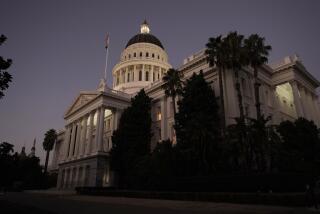House Defeats Broad Reform of Banking Laws
- Share via
WASHINGTON — The House on Monday resoundingly defeated far-reaching banking overhaul legislation, dealing an apparent death blow to efforts to produce sweeping reform of the nation’s Depression-era banking laws this year.
After three days of debate, the bill failed on a 324-89 vote. The margin of defeat included strong majorities of both Democratic and Republican lawmakers.
The Bush Administration had opposed the complex House bill. Its defeat ensures that the House Banking, Finance and Urban Affairs Committee will have to start from scratch to develop another comprehensive banking measure.
Any legislation the committee eventually produces is expected to be far narrower in scope than the defeated measure and fall well short of the kind of reform that the President originally envisioned. Among the provisions considered likely to die are proposals to give banks new powers to do business across state lines and to sell securities and insurance.
Action of some sort is needed soon because the Federal Deposit Insurance Corporation’s bank insurance fund is almost insolvent and will require a $30-billion line of credit from the Treasury to continue operating. The insurance fund, which safeguards deposits of as much as $100,000 per account, is financed primarily through premiums paid by federally insured banks. But losses from bank failures have almost depleted it.
Any measure that ultimately is passed by the House is likely to include little more than the additional FDIC borrowing authority, some relatively minor changes in deposit insurance and new rules requiring the government to act more promptly when banks fall below safe capital levels.
Despite the vote, Treasury Secretary Nicholas F. Brady made another pitch for a sweeping overhaul, warning in a statement that “a narrow recapitalization of the bank insurance fund will only delay the day of reckoning.”
Yet the results of Monday’s vote make it unlikely that a sweeping bill will reach Bush’s desk this year. Even if the Senate votes to include some of the President’s more ambitious proposals when it takes up its version of the bill later this week, they would appear unlikely to pass muster with the House.
The goal of the reform effort is to shore up the nation’s ailing banking system and prevent it from going the disastrous route that the savings and loan industry took in the 1980s. The S&L; bailout may ultimately cost taxpayers $130 billion plus interest.
Early in the House debate last week, Rep. Charles E. Schumer (D-N.Y.) warned his colleagues that the decisions they were making “could determine the success or failure, not only of our banking system, but our economy and our international competitiveness for years to come.”
Bush initially sought legislation that would expand banks’ powers in many areas, including lifting old restrictions against crossing state lines and against entering the insurance and securities businesses.
By diversifying, the President and his supporters argued, banks would be able to reduce their risks. Banks in New England, for example, would not find their fortunes tied only to that region’s depressed real estate and high-technology industries. Moreover, they said, unless U.S. banks are freed from their current strictures, they will be unable to compete with giant foreign institutions.
Opponents, however, argued that loosening the reins on savings and loans in the early 1980s proved to be the industry’s undoing because many S&Ls; used their new freedom to plunge headlong into highly risky and foolhardy ventures.
They contended that the banks created many of their own problems by making high-interest loans to deeply indebted Third World countries and by financing corporate takeovers and shaky real estate ventures.
The debate pitted big banks and securities firms against smaller financial institutions, insurance companies and consumer groups. Each side backed its arguments with doomsday scenarios, leaving many representatives confused and uneasy.
The most controversial elements of the House bill were conceived not by the full Banking Committee, but by its chairman, Henry B. Gonzalez (D-Tex.), and by Energy and Commerce Committee Chairman John D. Dingell (D-Mich.). Backed by the House Democratic leadership, the measure was billed as a compromise, but its ultimate undoing reflected the fact that it satisfied neither side.
“This legislation will do for the financial marketplace what the Hindenburg (dirigible explosion) did for air travel,” said Rep. Richard H. Baker (R-La.).
Although the House bill technically would have repealed the 1933 Glass-Steagall Act, which prevents banks from affiliating with securities firms, it contained such severe restrictions that opponents, including the Administration, argued that it was a step backward. Bush had threatened to veto it.
But, even with its restrictions, the bill did not soothe the qualms of lawmakers who were uncomfortable with granting the banks new powers.
More to Read
Get the L.A. Times Politics newsletter
Deeply reported insights into legislation, politics and policy from Sacramento, Washington and beyond. In your inbox twice per week.
You may occasionally receive promotional content from the Los Angeles Times.










